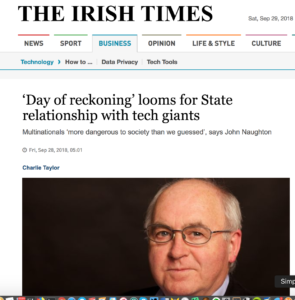Since the late 1950s, my native land’s grand strategy — initially for survival and later for prosperity — was to be welcoming to foreign multinational companies. For half a century, that strategy worked well. But now it’s become problematic. Why? Because some of the giant multinationals which have made Ireland their European bases have become toxic.
Chief among these is Facebook, the leading data-vampire. Until the other day, we had our suspicions about the subservience of the Irish government to the wishes and requirements of the Zuckerberg empire. Now — thanks to two remarkable pieces of reporting — we have some evidence of the cosy relationship that developed between Facebook’s second-in-command, Sheryl Sandberg (the ‘Typhoid Mary’ of surveillance capitalism, as Shoshana Zuboff describes her) and the previous Irish Taoiseach (Prime Minister), Enda Kenny.
The first breakthrough came from my Observer colleagues Carole Cadwalladr and Duncan Campbell and was based on a leaked internal Facebook document which described, among other things, Facebook’s
“great relationship” with Enda Kenny, the Irish prime minister at the time, one of a number of people it describes as “friends of Facebook”. Ireland plays a key role in regulating technology companies in Europe because its data protection commissioner acts for all 28 member states. The memo has inflamed data protection advocates, who have long complained about the company’s “cosy” relationship with the Irish government.
The document also noted
Kenny’s “appreciation” for Facebook’s decision to locate its headquarters in Dublin and points out that the new proposed data protection legislation was a “threat to jobs, innovation and economic growth in Europe”. It then goes on to say that Ireland is poised to take on the presidency of the EU and therefore has the “opportunity to influence the European Data Directive decisions”. It makes the extraordinary claim that Kenny offered to use the “significant influence” of the EU presidency as a means of influencing other EU member states “even though technically Ireland is supposed to remain neutral in this role”.
The second revelation comes from a terrific investigation by the Irish Independent newspaper. This tells how, two days after the meeting the Taoiseach in Davos (where else?), Sandberg wrote to Kenny, warning him how changes to taxation or privacy laws might lead Facebook to consider ‘different options for future investment and growth in Europe’.
Her email reads:
“I also want to commend you once again for your leadership during your Presidency of the EU. You made enormous progress. When it came to the European Data Protection Regulation, you and your staff really internalised our concerns and were able to present them in a reasonable way, which has had a positive impact …We hope we can rely on you for your continued leadership on this regulation since we still have more work to do here. Along the same lines, I was pleased to hear that you are so involved in the OECD working group process on tax reform. These discussions will be very complicated and important, and we hope to be helpful to you identifying the implications with different options for future investment and growth in Europe. We are keen to collaborate with your office on this, just as we have on the DPR.”
Following the meeting in Davos, Facebook’s Senior Policy team, comprising 15 executives from Washington, California, Dublin, and across Europe, requested a personal meeting with the Taoiseach in Government Buildings, Dublin on February 6 2014.
Kenny did not meet the delegation but instead sent his special adviser, Paul O’Brien, the Secretary General to the Government, Martin Fraser, and two of the Taoiseach’s experienced assistant secretaries with responsibility for international economic matters, Lorcan Fullam and John Callinan.
But then Kenny was given the treatment that generally suborns impressionable technically-illiterate politicians: an invitation to Facebook’s headquarters in Menlo Park, California, in June 2014, where he was granted a 43-minute audience with Sandberg.
According to the Independent report, the mogul and her awestruck visitor discussed the need for one tax regulator in the EU, and also the issue of who would replace Billy Hawkes as the Irish Data Protection Commissioner (who was due to retire on August 31 that year). And a follow-up letter to the Taoiseach in June 2014 specifically mentions Billy Hawkes and the need for his replacement to be “a strong candidate”.
“While Mr Hawkes’s independence and integrity are undisputed”, says the Independent — with an attentive eye to legal niceties — “there is no doubt that Facebook would have been relieved in 2013, when Mr Hawkes refused to investigate claims that Facebook Ireland had transferred data to the States for examination by the NSA”.
Background: Hawkes had refused the investigation on the legal grounds that Facebook was entitled to send data from the EU to the US under EU Commission Safe Harbour provisions. Interestingly, though, when Sandberg was being granted personal access to the Taoiseach, a judicial review of Hawkes’s decision had been initiated in the Irish High Court. And of course, in the end, the European Court ruled that the ‘Safe Harbour’ agreement was invalid.
These are extraordinary revelations, though I suspect they will surprise nobody familiar with the servile cringe that Irish politicians habitually adopt when dealing with their corporate ‘guests’. Note particularly, the tone and content of the leaked emails. For example:
-
Referring to the tricky challenge (for Facebook) of European Data Protection Regulation, you and your staff internalised our concerns and were able to present them in a reasonable way, which has had a positive impact. …We hope we can rely on you for your continued leadership on this regulation since we still have more work to do here.
-
And, on tax reform, I was pleased to hear that you are so involved in the OECD working group process on tax reform.
Emphasis added. Pass the sickbag, Alice.

